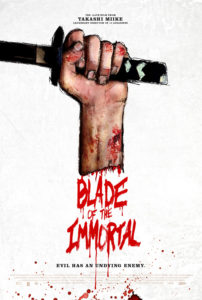If you look at this brutal dissection of the flop film Ghost in the Shell starring Scarlett Johansson, you can see that there were inherent problems with the thinking behind the movie. The movie managed to offend vast swathes of Asian cinema fans with its decision to whitewash the character list, and hinted, rather alarmingly, at the era of Asian-inspired films being popular coming to an end. Sure, the movie still made an estimated $167million at the worldwide box office, but it was critically ripped apart and the whole notion of reworking Japanese films seemed, for a while at least, to be a finished notion.
While this might all sound like a big lament at the state of cinema, what it has done is hopefully pull the rug to an extent from under the big movie-producing companies, instead allowing movies like Blade of the Immortal to shine through instead.
A Critical Success
With no huge box office hopes and no massive big blockbuster budget to spend on thrills that detract from the plot, this is a movie that has really concentrated on getting the plot and acting exactly right. This focus has had the desired effect and more, as this review shows, echoing the majority of positive critical reception. Despite only grossing around $7million at the box office, this movie helped to showcase the positive aspects of Japanese films, and gave a different twist on the world of samurai culture that movies like The Last Samurai and other big box office movies couldn’t quite achieve due to their need to sacrifice certain elements in order to please a wider audience.
#BladeOfTheImmortal has been nominated for Best Foreign Language Film by the @seattlecritics! pic.twitter.com/eU9u3MttqC
— BladeOfTheImmortal (@bladeofimmortal) December 12, 2017
As Samurai culture is still seen as having a mystical, even a mythical, status, creating serious intrigue for anybody interested in it, the ability of a movie to depict this world in a new and interesting way should always be welcomed. Indeed, the strength of this interest in Samurai culture clearly goes beyond just being a fad for the box office; it has almost fully permeated throughout the western world.
A Sub-culture of Interest or Hiding in Plain Sight?
Of course, many elements of Samurai culture are hidden in plain sight in Western culture, with one example being the Magnificent Seven movie and the way it is essentially a westernized retelling of Seven Samurai, but the interest in the culture has also played out in less obvious ways. It has resulted in Samurai-inspired videoslots that take inspiration from Japanese cultural icons and architecture to appeal to players, such as Samurai Split, while the Total War game series, which actually had two Shogun versions of the game, earned favorable reviews by not overplaying the westernized and less authentic version of Japanese culture.

“Silver Samurai” by (CC BY-SA 2.0)
On that same thread of authenticity, perhaps the most important lesson to take from the positive reviews of Blade of the Immortal is that the movie succeeds because it doesn’t try to please everyone and is true to its cinematic audience and therefore doesn’t allow itself to be diluted in a way that so many big box office hits can be. In this regard, if we are seeing a shift back to the days when Japanese films were cult hits, much like the original Ghost in the Shell movie, we might once again start seeing the best of Japanese and Asian-inspired cinema on our screens.




